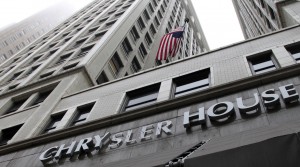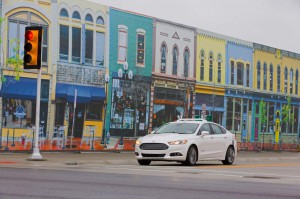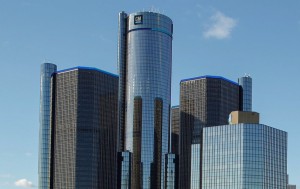
As the Detroit automakers rebound, so too is the city, region and other business. Many, like FCA, are re-establishing a presence in the city.
Like the city that helped give it life, Detroit’s auto industry is often seen as a Rust Belt relic, a perception underscored by moves by manufacturers like Ford, which is rapidly expanding its new tech center in Silicon Valley.
But just as the Motor City itself begins to revive after decades of disinvestment and so-called “white flight,” so is the local auto industry gaining new momentum. But it’s not just the traditional Detroit Big Three bouncing back after the Great Recession. The Southeast Michigan region is seeing a flood of new investment from traditional foreign rivals such as Toyota and Nissan, as well as from new, high-tech players including Uber and Google.
“What we’re realizing is there is a huge critical mass of talent in the Detroit area,” said Sherif Marakby, a long-time Ford veteran who joined Uber as its head of vehicle development earlier this year. At a news conference in the suburb of Novi, he announced this week plans to build a new autonomous vehicle development facility in the region.
Google recently announced similar plans. Such a move has several benefits, according to officials with the high-tech giant. For one thing, it gives Google access to the same talent pool Uber is seeking out. But it also allows the company to begin testing its prototype vehicles in a variety of different weather conditions, rather than just the sunny climes in places like Silicon Valley and Austin, Texas.
As the number of non-traditional companies looking at self-driving vehicles grows, “There will be even more (new players) there because it snows and snows a lot in Michigan. To be able to be used in the real world, you’ll need cars not just able to drive around in California sunshine, but in the nastiest of weather,” said Joe Phillippi, senior automotive analyst with AutoTrends Consulting.
Motown is banking on the need to deal with harsh weather realities as it prepares to add a second test complex specifically dedicated to autonomous driving. The first, run by the University of Michigan, is MCity, a 32-acre center on the north side of Ann Arbor. A second test track is expected to rise from the ashes of the old Willow Run B-24 bomber plant about 10 miles away.
The Motor City is also attracting new players in the electric vehicle market. Karma Automotive – the Chinese-owned start-up that acquired Fisker Automotive out of bankruptcy – last spring announced plans to invest $3.6 million in a suburban Detroit facility that will create about 150 new jobs.
“There are a lot of high tech companies coming here who didn’t think they needed to be part of the quote-unquote Rust Belt,” said Sandy Baruah, director of the Greater Detroit Chamber of Commerce. “But that level of disdain was so ill-informed.”
Analyst Phillippi readily agrees. And he points to Tesla, the battery-carmaker that has received widespread kudos for the technical sophistication of products like the Models S and X – but strong criticism for its endemic quality and reliability issues.
New companies like Tesla and the now bankrupt Fisker sorely underestimated the challenges of building products that require the validation of more than 10,000 different parts, along with the logistics of getting them all to the assembly line when needed.
(Will fuel economy rules cost millions of jobs or save billions of dollars? Click Here to find out.)
“When you’re putting all those parts together, they have to be right,” said Phillippi, adding that, “No one understands validation like Detroit.”
Even before the relatively new push for high-tech cars got on track, Detroit was already beginning to see an influx of investments from more traditional automotive manufacturers and their suppliers. Toyota, for example, has set up a cluster of R&D facilities, including a major test track, near the college suburb of Ann Arbor. Nissan, meanwhile, has a high-tech design and engineering center of its own closer to Detroit.
Indeed, the list of carmakers and auto suppliers with some presence in Metro Detroit reads like an industry Who’s Who, and it continues to grow.
The local talent pool is one reason, the local university research base another. Then there’s the government presence. The Environmental Protection Agency, for example, runs its key vehicle emissions testing center in Ann Arbor, about 45 minutes west of Detroit.
The EPA is currently conducting a midterm review of its latest fuel economy regulations, but it is widely expected to maintain the 54.5 mpg target set for 2025. That will put even more pressure on automakers to tap into the emissions and engine know-how in Detroit, according to various industry observers.
(Click Here to see if Apple’s Car Play might be McLaren.)
That’s good news for a region decimated by the Great Recession, which saw new vehicle sales drop below 10 million, a 40% decline, in 2010, costing tens of thousands of jobs and hammering local communities.
The automotive recovery and the expansion of regional industry investments has delivered an economic boom, but much of that, ironically, has benefited the suburbs, rather than Motown itself. Detroit’s own resurgence has been fueled, to a large degree, by non-automotive investors. Among the biggest: Quicken Loans, the mortgage lender that reversed a decades-old trend, moving its headquarters downtown.
But there are signs the city is also starting to get in on some of the automotive action. General Motors has been investing heavily in its riverfront Renaissance Center headquarters since emerging from Chapter 11 six years ago. Fiat Chrysler Automobiles has set up a large office in downtown, as well. Seat supplier Lear Corporation recently bought a 50,000 square-foot building, establishing – for the first time in decades – a presence in the city where it was founded.
Bringing in new manufacturing is a tougher sell, in part because of industry resistance to unionization. So, most of the new money is going into research or management operations. But global supplier Flex-N-Gate is opening a 350,000 square-foot manufacturing facility on the city’s east side. Costing $95 million, it will eventually employ 750 workers.
(Lyft founder predicts death of car ownership in large cities by 2025. For more, Click Here.)
As it stages its comeback, Detroit’s auto industry is looking very different from the metal-bending behemoths that put the town on the map more than a century ago. But those who were ready to write the Motor City off just a few years ago will have to think again.



liberal silly con valley needs a haircut anyway ☺
Liberal silly con valley needs a haircut anyway
So, Gov Snyder pushed through right-to-work after saying he wouldn’t, and it still doesn’t help to get new manufacturing?